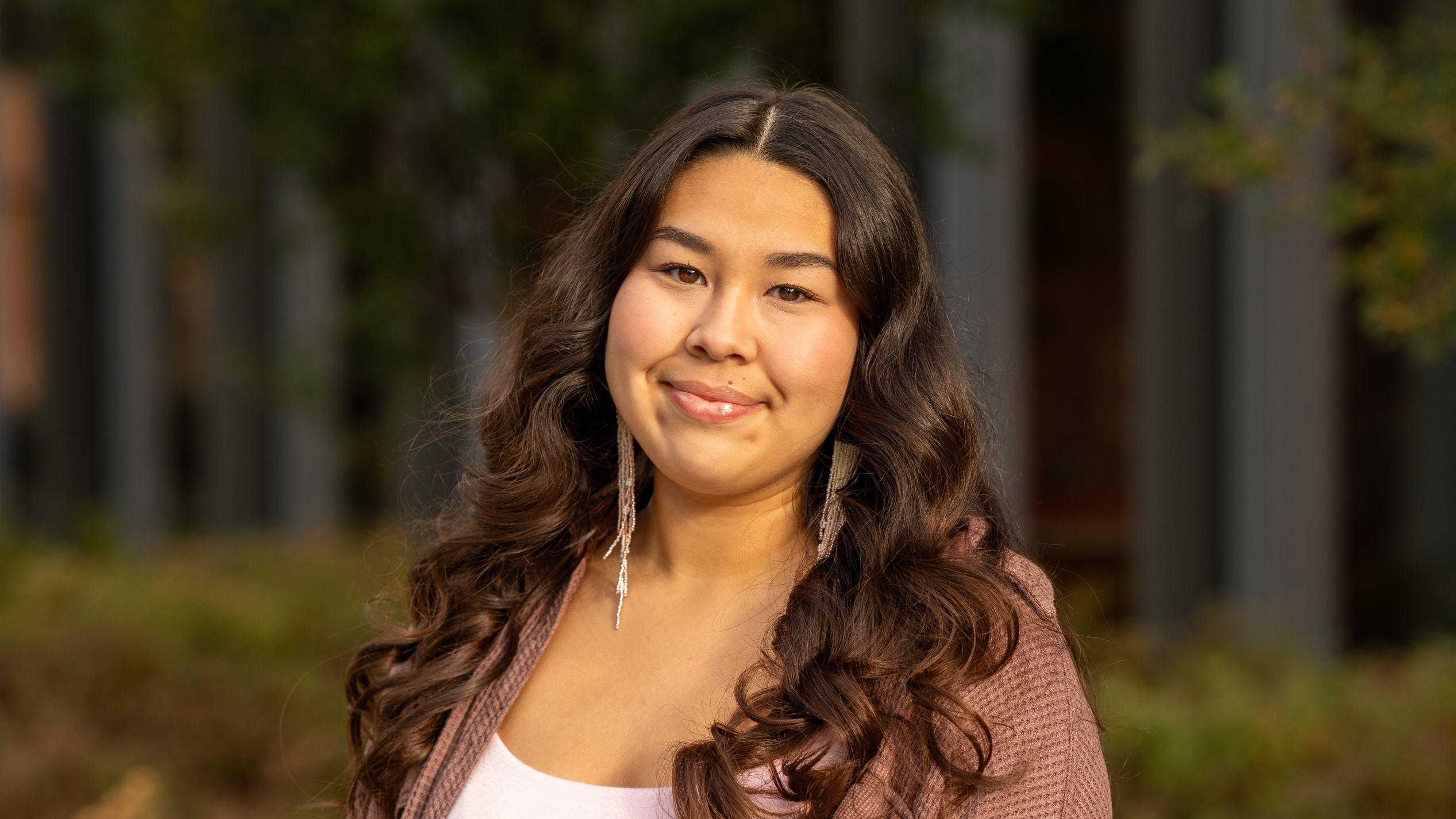First Section -- Sidebar
Meet Krissia
Krissia wanted to attend a school with a strong Indigenous community on campus, and she’s found a robust community here at Cornell. She loves that Ithaca’s hills, waterfalls, and greenery remind her of home, and she hopes to take her education from Cornell’s SC Johnson College of Business back to help her Indigenous community in Point Hope, Alaska.
What clubs/activities are you involved with on campus?
I am part of Native American and Indigenous Students at Cornell and Diversity and Inclusion in Real Estate.
What is your favorite thing about Cornell?
My favorite thing about Cornell is the natural surroundings around campus. The hills, waterfalls, and greenery remind me of home. Cornell has a gorgeous campus, and it is easy to connect with nature by taking a walk and seeing all the greenery, waterways, and small wildlife on campus.
What are your go-to campus resources? How did you discover them?
My go-to campus resources are the American Indian and Indigenous Studies Program (AIISP) and tutoring at the Learning Strategies Center. The AIISP is a student support-oriented program in Caldwell Hall on campus. Their floor has two student lounges, a kitchenette, and staff who are always there to support their students. Another resource I use is the tutoring provided by the Learning Strategies Center. The Learning Strategies Center offers daily tutoring in multiple subjects, supplement courses, and study plan support. I discovered both of these resources when they reached out to me, and then I took advantage of and utilized their resources.
What is one piece of advice or something you wish you knew when you were applying?
Navigating the FAFSA and the College Board CSS Profile was tough for me. This is why it is essential to start your financial aid application as early as possible! Organize all of your necessary documents and keep up with deadlines to ensure a successful application for financial aid. And don't be afraid to ask the Office of Financial Aid for help!
How did you find your friends and community at Cornell?
I found my friends and community at Cornell by living in the Akwe:kon program house, the Indigenous program house on campus. Like myself, many others living in this dorm are indigenous, and it was easy to make friends. I also met friends through classes and clubs, like the Native American and Indigenous Students at Cornell club.
Hometown
Point Hope, AlaskaCollege/School
- Cornell SC Johnson College of Business
Graduation Year
2026Pull Quote
When you were applying, why did you choose Cornell?
I chose Cornell because there is a strong Native American and Indigenous community on campus. I was very active with the Indigenous community in high school and wanted to attend a school with a strong Indigenous community on campus. The native community at Cornell is very active on campus, and I knew that Cornell was somewhere I could fit in. Cornell has an American Indian and Indigenous Studies Program, four Indigenous organizations and clubs, and an Indigenous residential program house called Akwe:kon.
Where is your go-to place to eat on campus, and what's your favorite thing to order?
I love going to Bus Stop Bagels. My go-to order is a Route 32 (grilled chicken, bacon, scallion cream cheese, avocado, and pepperjack on a Long Island bagel!) with an iced chai with oat milk. I get the pumpkin cream chai with oat milk if it's in season! Their bagels are always fresh, and the bagel sandwiches are nice and hot.
What inspires you?
I'm inspired by being a role model for younger Indigenous students in high school back at home. I did not have a role model who went to school out of state to look up to; now, I feel so grateful and inspired to succeed in my classes to show these students that they can do it, too. They can leave home and study something they're passionate about and should not be afraid to do so.
What is your favorite class so far, and why?
My favorite class has been AIIS 1110 Indigenous Issues in Global Perspectives with Professor Kassam. I know many of the issues that Indigenous peoples face here in North America, and this class taught me about other issues in other parts of the world and how these issues can be combated. Although some difficult topics were covered in class, Professor Kassam taught students about changes driven by Indigenous peoples, including granting personhood to nature and protests against fossil fuels that have successfully halted projects. At the end of the class, I reflected on everything I learned and remained hopeful that Indigenous peoples will no longer face these issues.
What are your plans after graduation?
When I graduate, I will return home and use my education to help my Alaskan Native people. My interests are in real estate investment and development. Once I find success in this field, I wish to create a nonprofit organization aimed at helping and providing Indigenous people with affordable housing. My elders have always told me to bring back my education to help our people, and I intend to do this.
Tell us about your favorite place to study.
My favorite place to study has been the undergraduate student lounge in the American Indian and Indigenous Studies Program office. It is located on the Ag Quad, my home base as a Dyson student. I also like that Bus Stop Bagels and Mann Cafe are both within a five-minute walking distance from the lounge. Our lounge has plenty of workspace, computers, and printers. It is where many of my friends work, too, so I get to see them whenever I study there.
Tell us about your favorite spot on campus or in Ithaca.
My favorite spot in Ithaca is Collegetown Bagels. They have a couple of locations in town, and one is close to campus in Collegetown. They have many options for food and drinks and plenty of seating for studying.

